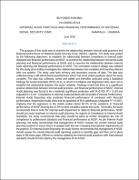| dc.description.abstract | ABSTRACT
The purpose of this study was to examine the relationship between internal audit practices and financial performance of National Social Security Fund, (NSSF), Uganda. The study was guided by the following objectives; to establish the relationship between compliance to internal audit standards and financial performance at NSSF, to examine the relationship between of internal audit planning and financial performance at NSSF and to examine the relationship between internal audit reporting and financial performance at NSSF. The correlation research design was selected for this study since it ably investigates the relationship between two variables and how they interact with one another. The study used both primary and secondary sources of data. The data was collected using a self-administered questionnaire which had close ended questions about the study variables. The data was collected, sorted and edited and thereafter analyzed using a Statistical Package for Social Scientists (SPSS 20.0), in which Correlation and Regression tests were run to establish the relationship between the study variables. Findings reveal that there is a significant positive relationship between internal audit practices, and financial performance of NSSF. Internal Audit planning was found to be a moderate significant predicator with R=0.403, R2= 0.163 and Adjusted R= 0.147. Compliance to Internal Audit standards did not predict Financial Performance. Internal Audit Reporting only predicted financial performance if combined with financial performance. Regression results show that the goodness of fit is satisfactory (Adjusted R2 = 0.587), implying that the regressors in the model explain about 58.7% of the variations in financial performance of NSSF, leaving the 41.3% to other variables outside this study. Generally, the study recommends that in order for internal audit department to relate to financial performance, NSSF should put much emphasis on internal audit planning. As regards to Compliance to Internal Audit Standards, the study recommends that steps should be taken to further strengthen the role of compliance to professional standards and financial performance at NSSF. As per Internal Audit planning, the study recommends that management of NSSF reviews the current internal audit planning systems to ensure that it is updated with the ever changing international requirements of the practice. On internal Audit Reporting, the study further recommends that management of NSSF should review the current internal audit reporting systems to identify gaps and then put in place steps to fill those gaps. Efforts to continue updating the internal audit practices with international standards should be held vital by the management of the NSSF. | en_US |

